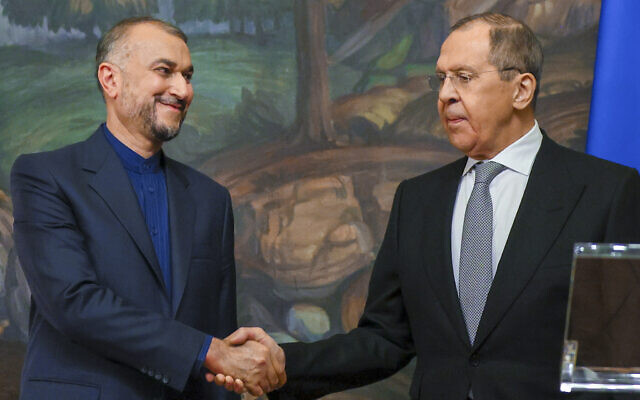
Development enables resumption of talks that were stalled after Moscow demanded assurances that sanctions over Ukraine won’t impact its ties with Tehran.
Russia’s Foreign Minister Sergey Lavrov said Tuesday that Moscow had received guarantees from the US on its ability to trade with Tehran as part of ongoing talks to salvage the Iran nuclear deal.
“We received written guarantees. They are included in the text of the agreement itself on the resumption of the Joint Comprehensive Plan of Action on the Iranian nuclear program,” Lavrov told reporters during a press conference with his Iranian counterpart in Moscow.
If this is correct, it is yet another humiliation of the Biden team, signaling total surrender to the Iran-Russia axis, especially at the time of Russia’s brutal war against Ukraine.
Iranian Foreign Minister Hossein Amir-Abdollahian was in the Russian capital days after negotiations to salvage the Iran nuclear deal stalled amid new Russian demands.
More than 10 months of talks in Vienna have brought major powers close to renewing the landmark 2015 deal on regulating Iran’s nuclear program.
But the negotiations were halted after Russia on March 5 demanded guarantees that Western sanctions imposed following its invasion of Ukraine would not damage its trade with Iran.
Lavrov told reporters in Moscow on Tuesday that guarantees it had received from Washington would protect Russian involvement in Iran’s sole Bushehr nuclear energy plant.
Lavrov said Moscow and Tehran share the position that Western sanctions are imposed with the aim of overriding international law and accused Washington and its partners of directing the penalties “primarily against ordinary citizens.”
On March 11, the European Union’s foreign policy chief Josep Borrell tweeted that the pause was “due to external factors,” despite the fact that “a final text is essentially ready and on the table.”
The United States then put the ball in Iran and Russia’s courts.
“We are confident that we can achieve mutual return to compliance… (if) those decisions are made in places like Tehran and Moscow,” said State Department spokesman Ned Price.
US Secretary of State Antony Blinken has dismissed as “irrelevant” the Russian demands for guarantees, saying that they “just are not in any way linked together.”
But on Monday, Iran’s foreign ministry spokesman repeated Tehran’s position that the move had to come from the US.
“The remaining issues and points between us and the United States need political decisions in Washington,” Saeed Khatibzadeh said.
“If they (the US) announce that they have made a decision, then all the delegations can return to Vienna” to finalize a deal, he said, adding that for now “we are not at the point of announcing the agreement.”
Russia and Iran have seen relations improve in recent years, and Moscow plays a central role in enforcing the 2015 pact, in particular by receiving excess enriched uranium from Tehran.
The JCPOA aimed to ensure Iran would not be able to develop a nuclear weapon, which it has always denied seeking.
On Saturday, Britain, France and Germany warned against moves to “exploit” the JCPOA, seen as a tacit warning to Russia.
“Nobody should seek to exploit JCPOA negotiations to obtain assurances that are separate to the JCPOA,” the British, French and German foreign ministries said in a statement.
“This risks the collapse of the deal, depriving the Iranian people of sanctions lifting and the international community of the assurance needed on Iran’s nuclear program,” they added.
The deal gave Iran sanctions relief in exchange for curbs on its nuclear program.
But the US unilaterally withdrew from the accord in 2018 under then-president Donald Trump and imposed tough economic sanctions on different sectors, including oil exports. Iran responded by dropping some of its own commitments and ramping up uranium enrichment to levels that have raised concerns it is approaching the threshold for producing a nuclear bomb.
The current round of negotiations started in late November in the Austrian capital between Iran and Britain, China, France, Germany and Russia, with the US taking part indirectly.
(Times of Israel / AFP).